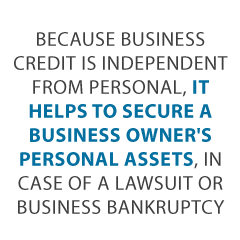- Connect With Us!
- (877) 600-2487
- info@creditsuite.com
Top 7 Ways to Separate your Personal and Business Credit
Published By Janet Gershen-Siegel at August 8th, 2017
How to Separate Your Personal and Business Credit
It is a responsible question to ask: how can you separate your personal and business credit? It is particularly important when you are a sole proprietor, or you’re just getting started, or both.
So here is a countdown of the top seven ways to separate your business and personal credit and keep everything from becoming commingled (and make the IRS happy while doing so!).
Separate Your Personal and Business Credit: Number 7 – Start a Business Checking Account and other Bank Accounts
Nothing says commingling like paying your business expenses with My Little Pony checks. So don’t!
Instead, talk to your local bank about getting a business checking account. It will take, maybe, a half an hour. Not only will your financials be better organized, you will also be able to see just where your money goes. As for your own funds, pay yourself (you do pay yourself, right?) and then deposit those funds into your personal account. Then treat it like a salary from any other company.
Use this account for all of your business-related transactions. Plus a business checking account lets your business use employee payments as tax deductions from income. And it also lets you show personal income for necessaries such as loans, credit, and taxes. Business lenders will want to see these bank statements to really see how you’re doing.
Learn more here and get started toward establishing company credit.
Separate Your Personal and Business Credit: Number 6 – Use Business Credit to Finance Your Business, and Not Your Own Credit Accounts
Lots of suppliers and lenders like to extend lines of credit to businesses. This can help you finance purchases and conserve cash. So get your financing from sources such as business credit cards, bank lines of credit, vendor lines of credit, and even equipment leasing.
This helps your company build a business credit history. And, just like for your personal credit history, always pay on time. The business credit bureaus will add your positive payment history to a credit file dedicated just to your company. In addition, you might be able to deduct interest from business credit cards. When you apply for a business card, make sure to verify that the card provider reports to business credit bureaus and not to personal ones. This also helps assure your personal credit doesn’t suffer when your company hits lean times.
Also open credit lines with vendors and suppliers, e. g. trade credit. This can give you extra time (net 15, 30, or 60 days) to pay for supplies and services.
Separate Your Personal and Business Credit: Number 5 – Apply for Appropriate Bills Through your Business
These include everything from Wi-Fi in your business’s name to a cell phone for your business where your business gets the bill and you don’t. Your business could pay a phone provider or even the oil or gas bill, if appropriate. As with credit cards and trade credit, your company will see credit scores rise by paying the bills on time.
Separate Your Personal and Business Credit: Number 4 – Start and Maintain Your Company’s Presence on the Internet
This goes beyond a business website (although that is a good start). It also means paying for hosting through your company for its own site, a part of #5. It means moving your personal site off the company’s server and hosting account. Stop using Gmail or the like and get dedicated email.
Start social media accounts for your company, and don’t forget to lock down alternate spellings, if appropriate (for example, if your company has the number 5 in its name, then lock down both 5 and Five plus the remainder of the company name). Make sure to also grab domains for your business name plus stinks (and stronger language); if you need them, you’ll be very glad you took this step early if your company is ever in crisis.
Social media presence is key, but different companies work best with different platforms. However, no matter what, your company needs to be on Facebook, which has become the informational directory on the internet. As for other platforms, consider your customer base. If you sell children’s clothing, your customers aren’t just kids; they’re also their parents and grandparents, so grow your social media presence accordingly.
Learn more here and get started toward establishing company credit.
Separate Your Personal and Business Credit: Number 3 – Work with the Internal Revenue Service
Visit the IRS website and obtain an EIN for the company. They’re totally free. Choose a business entity like corporation, LLC, etc.
A business can get started as a sole proprietor. But they will probably wish to change to a variety of corporation or an LLC.
This is in order to reduce risk. And it will take full advantage of tax benefits.
A business entity will matter when it involves taxes and liability in case of a lawsuit. A sole proprietorship means the entrepreneur is it when it comes to liability and taxes. No one else is responsible.
Sole Proprietors Take Note
If you run a company as a sole proprietor, then at the very least be sure to file for a DBA. This is ‘doing business as’ status.
If you do not, then your personal name is the same as the small business name. Therefore, you can wind up being personally liable for all company financial obligations.
Additionally, according to the Internal Revenue Service, with this arrangement there is a 1 in 7 possibility of an IRS audit. There is a 1 in 50 possibility for corporations! Prevent confusion and significantly lower the odds of an Internal Revenue Service audit simultaneously.
Separate Your Personal and Business Credit: Number 2 – Monitor Your Business Credit Regularly
Know what is happening with your credit. Make certain it is being reported and fix any mistakes as soon as possible. Get in the practice of taking a look at credit reports and digging into the specifics, and not just the scores.
We can help you monitor business credit at Experian and D&B for 90% less than it would cost you at the CRAs. See: fastcs.wpengine.com/monitoring.
At D&B you can monitor at: www.dandb.com/credit-builder. At Experian, you can monitor your account at: www.smartbusinessreports.com/Landing/1217/. And at Equifax, you can monitor your account at: www.equifax.com/business/business-credit-monitor-small-business. Experian and Equifax cost about $19.99; D&B ranges from $49.99 to $99.99.
Update Your Information
Update the data if there are mistakes or the information is incomplete. At D&B, you can do this at: https://iupdate.dnb.com/iUpdate/viewiUpdateHome.htm. For Experian, go here: www.experian.com/small-business/business-credit-information.jsp. So for Equifax, go here: www.equifax.com/business/small-business.
Fix Your Business Credit
So, what’s all this monitoring for? It’s to contest any mistakes in your records. Errors in your credit report(s) can be fixed. But the CRAs usually want you to dispute in a particular way.
Get your business’s PAYDEX report at: www.dnb.com/about-us/our-data.html. Get your company’s Experian report at: www.businesscreditfacts.com/pdp.aspx?pg=SearchForm. And get your Equifax business credit report at: www.equifax.com/business/credit-information.
Disputes
Disputing credit report mistakes usually means you mail a paper letter with copies of any proof of payment with it. These are documents like receipts and cancelled checks. Never mail the original copies. Always send copies and retain the original copies.
Fixing credit report inaccuracies also means you specifically detail any charges you challenge. Make your dispute letter as clear as possible. Be specific about the problems with your report. Use certified mail so that you will have proof that you sent in your dispute.
Dispute your or your business’s Equifax report by following the instructions here: www.equifax.com/small-business-faqs/#Dispute-FAQs.
You can dispute errors on your or your company’s Experian report by following the instructions here: www.experian.com/small-business/business-credit-information.jsp.
And D&B’s PAYDEX Customer Service phone number is here: www.dandb.com/glossary/paydex.
Separate Your Personal and Business Credit: Number 1 – Make Your Business as a Separate Legal Entity Via Incorporation
Meet with your tax advisor or financial planner to determine which legal entity (sole proprietor, LLC or S-Corp) best fits your business and financial situation. Incorporation will help protect your personal assets in the event of a lawsuit, too. Once your corporation or LLC is registered on the Secretary of State’s website, you can get a Business Federal Tax ID Number, so you can open your business’s bank account (remember #7?).
You can’t go wrong with untangling your finances. So separate your personal and business credit today.
Bonus Way to Separate Your Personal and Business Credit: Build Company Fundability
A company must be fundable to credit issuers and merchants.
That’s why, a small business will need a professional-looking website and email address. And it needs to have website hosting bought from a vendor like GoDaddy.
Additionally, business telephone and fax numbers ought to have a listing on ListYourself.net.
In addition, the business telephone number should be toll-free (800 exchange or comparable).
A company will also need a bank account devoted solely to it, and it must have every one of the licenses essential for running.
Licenses
These licenses all must be in the accurate, appropriate name of the small business. And they must have the same business address and telephone numbers.
So bear in mind, that this means not just state licenses, but potentially also city licenses.
Learn more here and get started toward establishing company credit.
A Word about What Happens when You Separate Your Personal and Business Credit
Always use credit smartly! Never borrow more than what you can pay back. Keep an eye on balances and deadlines for payments. Paying on time and fully will do more to increase business credit scores than almost anything else.
Establishing business credit pays. Excellent business credit scores help a business get loans. Your loan provider knows the company can pay its debts. They understand the business is authentic.
The small business’s EIN links to high scores and lenders won’t feel the need to require a personal guarantee.

 " class="attachment-blog-single size-blog-single wp-post-image" alt="Get Business Credit Cards for New Businesses Credit Suite-Business Line of Credit Decoded" title="Get Business Credit Cards for New Businesses">>
" class="attachment-blog-single size-blog-single wp-post-image" alt="Get Business Credit Cards for New Businesses Credit Suite-Business Line of Credit Decoded" title="Get Business Credit Cards for New Businesses">>
